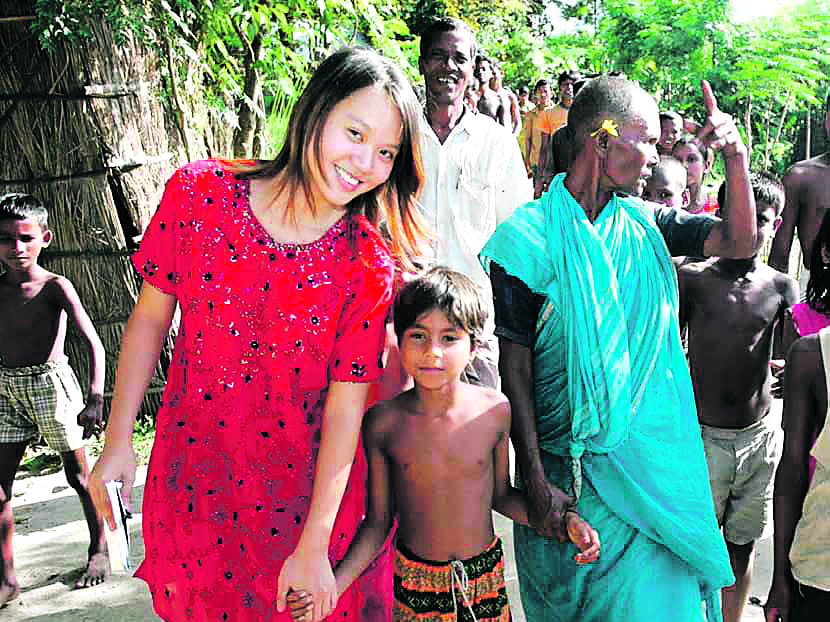Blazing the trail

Ms Adrianna Tan is on a mission to improve the lot of girls from disadvantaged backgrounds in India through the Gyanada Foundation. Photo: Adrianna Tan
SINGAPORE — One of Singapore’s most well-known bloggers and the brains behind the first edition of FailCon Singapore, a convention based on the philosophy of embracing and learning from failure, Ms Adrianna Tan, 27, is a trailblazer on many fronts in the digital and social spheres.
Her latest mission is in India, where she is attempting to improve the lot of girls from disadvantaged backgrounds through her non-government organisation (NGO), the Gyanada Foundation. The organisation, which had its soft launch in March, focuses on helping to provide underprivileged girls opportunities in education.
Gyanada works through its NGO partners in education. The girls apply for scholarship and funding schemes through these NGOs, while the foundation provides the funds.
Ms Tan’s first trip to India was with a Singapore International Foundation mission, Project Akriti. It sowed the seeds for Gyanada, exposing the group to many underprivileged, under-served sectors of Kolkata society.
“I recall a time at a youth centre run by the NGO Sanlaap, when an older girl was treated like a rock star as she was the first girl from that (impoverished) background to go to university,” said Ms Tan. “There was a sense of awe among the younger girls (who were clearly inspired). If given the right opportunities, they would have wanted that for themselves as well.
“I was struck by that. It was an image which stayed with me for the next 10 years. I found myself wanting to help create those right opportunities for even more girls if I could.”
Ms Tan said she brings to Gyanada her experience in “communications (and) international relationships, and a bucketload of enthusiasm”. Her technical skills and knowledge of social media also made Gyanada’s crowd-funding campaign, blog, presence on Twitter and Facebook and marketing campaign possible.
Such efforts have created a significant network in India, which is home to her as much as Singapore is. Having visited the country more than 50 times in the past decade, she has gained significant insights.
“The difference between funding a (five-year-old) girl in school in India and not providing (the funds) can sometimes mean she can’t go to school at all. The situation is really dire, despite the progress of universal education at (the) primary level, and there’s still a lot to be done,” she said.
Her strong belief in the benefits of education was instilled in her by her family. “My family was not particularly well off, but my dad inspired me a lot,” she said, adding that he understood the importance of education.
“As a child, (there were) kids who he would tutor for free or very little money. I was moved by that. I am trying to use my talent, skills and connections to do the same thing as my father, but (on a larger) scale.”
Ms Tan has also met people who have done “interesting things” — lawyers working for a cause and bankers who ran their own restaurants. “It was very empowering,” she said.
Gyanada, co-founded by Ms Tan’s friend and financial consultant Harsh Gupta, was set up in Singapore so it can reach out to the international non-resident Indian community, the overseas Indian diaspora and people who are open and keen to help promote its cause.
“It was also far easier to set up here,” admitted Ms Tan. “We started the process of incorporating a trust in India at the same time that we set up Gyanada in Singapore. Gyanada India is not yet ready legally and it will take more paperwork before we are done.”
Although the foundation is a work in progress, Ms Tan is pleased and excited to say that it has sent about 150 girls to school in four states in India for the academic year 2013/2014.
The Gyanada team is putting together the road map for next year’s programme, which will expand its basic model of funding to help more girls and states by tapping more NGOs that are involved in education.
There are plans to hire some full-time field workers. “We need three times more money than we have raised if we want to double the number of girls (under support) and run some co-curricular programmes. We also want to do research in education policy and that costs money. We will need to expand our network of donors,” said Ms Tan.
Eventually, the foundation would like to move beyond funding and into personal development and vocational and industrial attachments, but its priority is to put underprivileged girls in school first.
This is an abridged version of a story appearing in the latest edition of SINGAPORE magazine (http://singaporemagazine.sif.org.sg/) published by the Singapore International Foundation.





